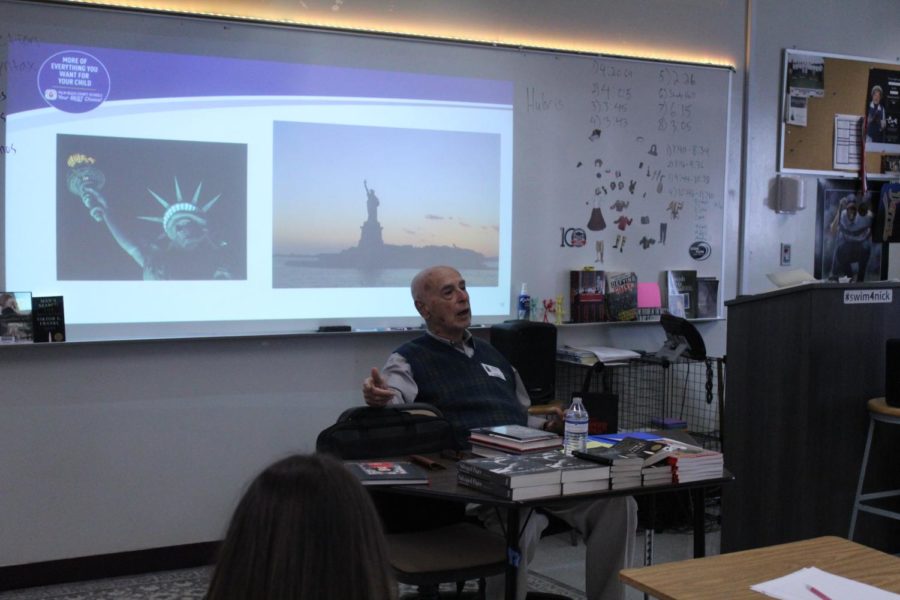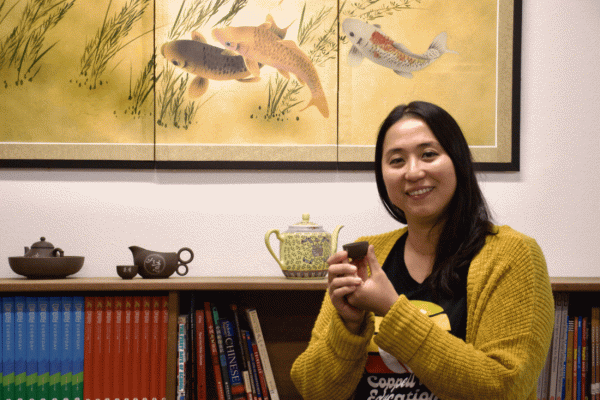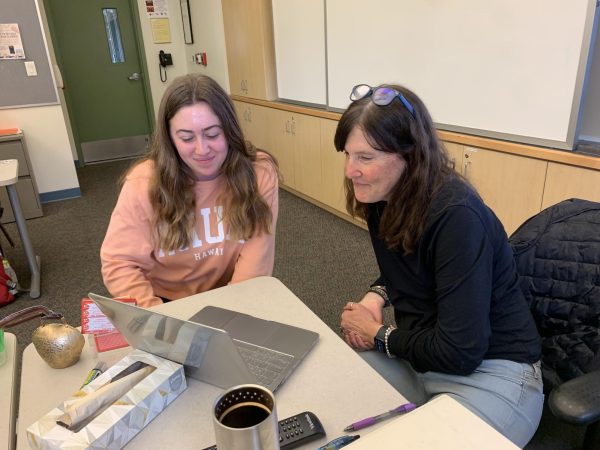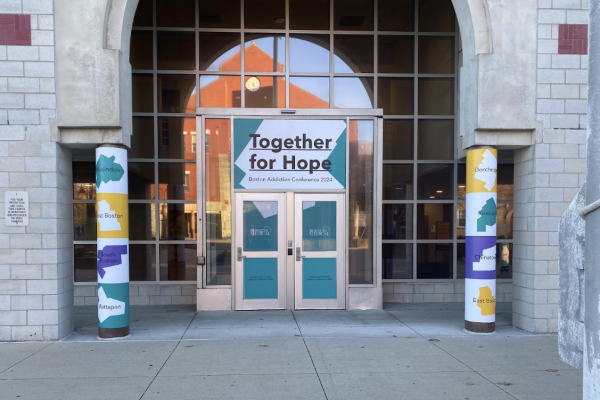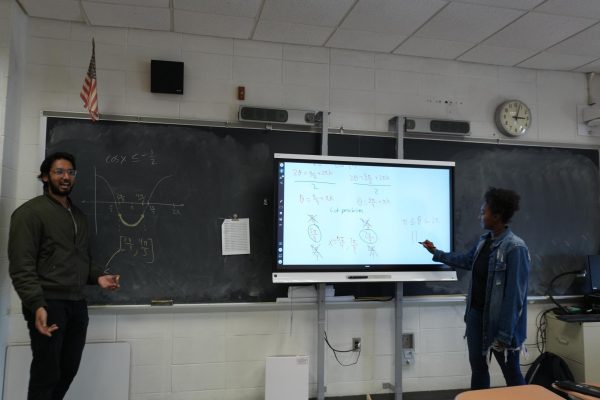Holocaust survivor Eric Lipetz shares his survival story with MSD students
Mariapaz Santacoloma
Holocaust survivor Eric Lipetz presents the struggles he faced coming to America to Darren Levine’s Holocaust class as a guest speaker. Lipetz and his family resided in the Philippines as a result of a Jewish quota, where he was eventually put into the Santo Tomas Internment Camp.
December 15, 2022
As time passes, there are fewer and fewer Holocaust survivors remaining; however, among those still with us, is Eric Lipetz. Lipetz has dedicated his life to sharing his story with students and educating them on the horrors him and so many others endured.
On Friday, Nov. 18, Marjory Stoneman Douglas High School’s Holocaust class listened to him speak. The speech detailed his and his family’s experiences during the Holocaust, how they survived and all of the great feats they conquered to regain their freedom.
Lipetz lived happily with his mother, father and two older brothers in Belgium until the age of four, when bombings forced them to flee to Portugal. Once they reached Portugal, they planned on taking a boat to the United States. With much struggle, they managed the journey, but as they disembarked, they were met with the news of a Jewish quota. A Jewish quota was a discriminatory quota, limiting or denying Jews’ access to certain institutions.
“We are coming to America. No Nazis chasing us, no gas chambers, no one’s going to kill us, no one’s going to bayonet us,” Lipetz said while recalling this portion of his story. “We’re going to be able to live safely. We’re going to have a life in America. We’ve traveled and run so far and look now, we’re in America.”
As a result of this quota, Lipetz and his family were almost condemned to be sent back to Belgium, but his uncle’s connections enabled them to reside in Manila, Philippines. That December, the U.S. went to war with Japan and the Lipetz family was unable to find a way out of the Philippines before the country was invaded. Thus, they were captured, along with all of the other civilians, and put into the Santo Tomas Internment Camp, also in Manila.
Lipetz’s father managed to make a deal with the Japanese army, in which he and his family would be allowed to return to their home if he taught other Filipinos to make bristles in order to clean the Japanese weaponry. Yet, his father was soon approached by Filipino guerrillas, whom he helped by using the bristles to make the Japanese’s guns misfire or blow up after a few uses.
Life went on rather calmly for a while following this alliance, but the war quickly intensified and more and more Japanese and German forces arrived. After much hardship and struggle to remain together, Lipetz and his family, with the help of the guerillas, fled to Pasig, as they were in immediate danger due to American and Nazi bombings.
After a long and hard journey, Lipetz was freed by American soldiers, including Col. John Hall, whom he credits with his emancipation. Lipetz has since been searching for relatives of the Colonel in order to thank them and let them know of all that he had done for him and his family.
Once Lipetz concluded the telling of his story, he offered words of advice to students, encouraging them to appreciate everything, no matter how small or seemingly insignificant. He hopes that by listening to him speak, students will be better able to understand the enormity of what he and countless others went through and the impact it had on a global scale.
“I’m just so happy to be able to talk to you and be able to see you, and I hope that you get the message: don’t take anything for granted,” Lipetz said. “Don’t take living in this country for granted. Be good and more than anything be thankful.”
Upon listening to Lipetz, students felt that they had gained a new, broader and more nuanced perspective on the events, as well as a new level of sympathy for those who endured them.
“I think it’s important in a way, to hear the story itself, from someone who was a part of the events,” senior Andy Hurtado said. “Sure, reading it in a book or watching it as a movie is interesting, but when you hear the story in real life, from a survivor, it really changes the perspective of things. As someone from a family who barely knows anything about the Holocaust, listening to his story really broadened my view on the tragic event.”
Lipetz achieved his goal, at least when it came to MSD students, touching their hearts and forever altering the ways in which they view the Holocaust, shining a different light on the events in a way that only someone who lived through them could.
This story was originally published on The Eagle Eye on December 7, 2022.



























![IN THE SPOTLIGHT: Junior Zalie Mann performs “I Love to Cry at Weddings,” an ensemble piece from the fall musical Sweet Charity, to prospective students during the Fine Arts Showcase on Wednesday, Nov. 8. The showcase is a compilation of performances and demonstrations from each fine arts strand offered at McCallum. This show is put on so that prospective students can see if they are interested in joining an academy or major.
Sweet Charity originally ran the weekends of Sept. 28 and Oct. 8, but made a comeback for the Fine Arts Showcase.
“[Being at the front in the spotlight] is my favorite part of the whole dance, so I was super happy to be on stage performing and smiling at the audience,” Mann said.
Mann performed in both the musical theatre performance and dance excerpt “Ethereal,” a contemporary piece choreographed by the new dance director Terrance Carson, in the showcase. With also being a dance ambassador, Mann got to talk about what MAC dance is, her experience and answer any questions the aspiring arts majors and their parents may have.
Caption by Maya Tackett.](https://bestofsno.com/wp-content/uploads/2024/02/53321803427_47cd17fe70_o-1-1200x800.jpg)
![SPREADING THE JOY: Sophomore Chim Becker poses with sophomores Cozbi Sims and Lou Davidson while manning a table at the Hispanic Heritage treat day during lunch of Sept 28. Becker is a part of the students of color alliance, who put together the activity to raise money for their club.
“It [the stand] was really fun because McCallum has a lot of latino kids,” Becker said. “And I think it was nice that I could share the stuff that I usually just have at home with people who have never tried it before.”
Becker recognizes the importance of celebrating Hispanic heritage at Mac.
“I think its important to celebrate,” Becker said. “Because our culture is awesome and super cool, and everybody should be able to learn about other cultures of the world.”
Caption by JoJo Barnard.](https://bestofsno.com/wp-content/uploads/2024/01/53221601352_4127a81c41_o-1200x675.jpg)




